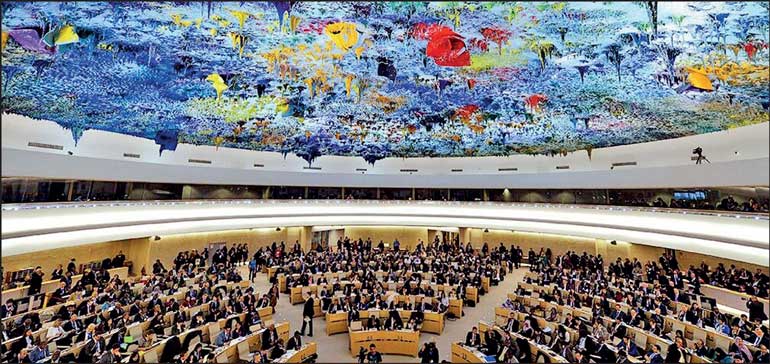Wednesday Feb 18, 2026
Wednesday Feb 18, 2026
Friday, 19 September 2025 00:24 - - {{hitsCtrl.values.hits}}

Close on 13 years after the matter came up for discussion in Geneva it continues to be debated
 In June 2010, the Secretary-General appointed the Panel of Experts on Accountability in Sri Lanka to advise him on accountability issues in Sri Lanka and offered it as a resource to the Government, and particularly to the Lessons Learnt and Reconciliation Commission.
In June 2010, the Secretary-General appointed the Panel of Experts on Accountability in Sri Lanka to advise him on accountability issues in Sri Lanka and offered it as a resource to the Government, and particularly to the Lessons Learnt and Reconciliation Commission.
The title of this article goes back to 2012 when the Human Rights Council used it for the first of succeeding annual resolutions on Sri Lanka. At the 19th Session of the Council they adopted resolution (A/HRC/19/2) ‘Promoting reconciliation and accountability in Sri Lanka 19th Regular Session (2012 Feb). It:
The UN emphasises constructive recommendations made in the report of the Lessons Learnt and Reconciliation Commission AND to present, as expeditiously as possible, a comprehensive action plan.
Distinct, actionable recommendations
The LLRC’s report contained 189 distinct, actionable recommendations, which fall into the following categories: 1. Credibly investigating widespread allegations of extrajudicial killings and enforced disappearances 2. Demilitarising the north of Sri Lanka 3. Implementing impartial land dispute resolution mechanisms 4. Re-evaluating detention policies 5. Strengthening formerly independent civil institutions 6. Reaching a political settlement on the devolution of power to the provinces 7. Promoting and protecting the right of freedom of expression for all 8. Enacting rule of law reforms 9. National languages, social integration and reconciliation 10. Return, restitution and development 11. Vulnerable groups.
Immediately after the Geneva Resolution was adopted in March 2012, Secretary of State, Hillary Clinton extended an invitation to External Affairs Minister Peiris, for a discussion in Washington that was accepted by Minister Peiris. Summing up the meeting Minister Peiris had with Secretary Clinton, spokeswoman Victoria Nuland told the media on Friday 18 May 2012, “The Sri Lankan Foreign Minister presented a very serious and comprehensive approach to the Lesson Learnt and Reconciliation Commission’s implementation”. Secretary Clinton was quoted saying, the (SL) presidential secretariat’s program is an, “excellent mechanism for implementing the LLRC’s recommendations. External Affairs Ministry Secretary, Amunugama told the local media a week later (24 May), the action plan is still being prepared by a Committee headed by Presidential Secretary Weeratunge and no date could be fixed for its completion. He stressed Minister Peiris had not given a written document to US Secretary Clinton. It’s only a verbal explanation, he stressed. Our troubles with the UN Human Rights Council began soon after.
Then President Mahinda Rajapaksa requested such an action plan to be developed. It was entrusted to a committee which used to sit at the Central Bank building. Secretary to President asked I joined the committee. In all seriousness I joined much to the shock of the gentleman presiding. It was the first and last time I joined the committee since there were no intimations to join thereafter.
In July 2012, the Government issued a national plan of action for the implementation of the recommendations of the Lessons Learnt and Reconciliation Commission.
Commitments on only selected recommendations
At the 11 February 2013 sessions of the Human Rights Council Office of the United Nations High
Commissioner for Human Rights went on to say, “The Lessons Learnt and Reconciliation Commission made significant and far-reaching recommendations towards reconciliation and strengthening the rule of law in Sri Lanka, despite its limitations. To date, the Government has made commitments on only selected recommendations of the Commission, and has not adequately engaged civil society in support of a more Consultative and inclusive reconciliation process.”
Verite research in 2014 concluded the Government’s report on progress is inaccurate. In 2016 Verite reported Overall Status of Implementation as approximately 20% of the LLRC’s 189 distinct, actionable recommendations has been completed. Approximately 57% of LLRC recommendations have seen partial progress in implementation, while 22% of recommendations have seen poor progress in implementation.
In 2017 a ‘National Policy on Reconciliation and Coexistence Sri Lanka’ was adopted by Government. The implementation plan sought to Develop a National Action Plan on Reconciliation and Coexistence, Identify the segments those have become marginalised over the years since independence within the social layers of the Sri Lankan society due to ethnic, religious, linguistic, social, political and economic factors, Develop affirmative action programs for the marginalised within the National Action Plan on Reconciliation and Coexistence, Launch public awareness and education campaigns on the National Policy on Reconciliation and Coexistence and the National Action Plan AND Mainstream the values defined in this National Policy on Reconciliation and Coexistence within government institutions and existing national initiatives through annual work plans.
(The writer is former Member Commissioner, Election Commission and former Governor, Northern Province.)